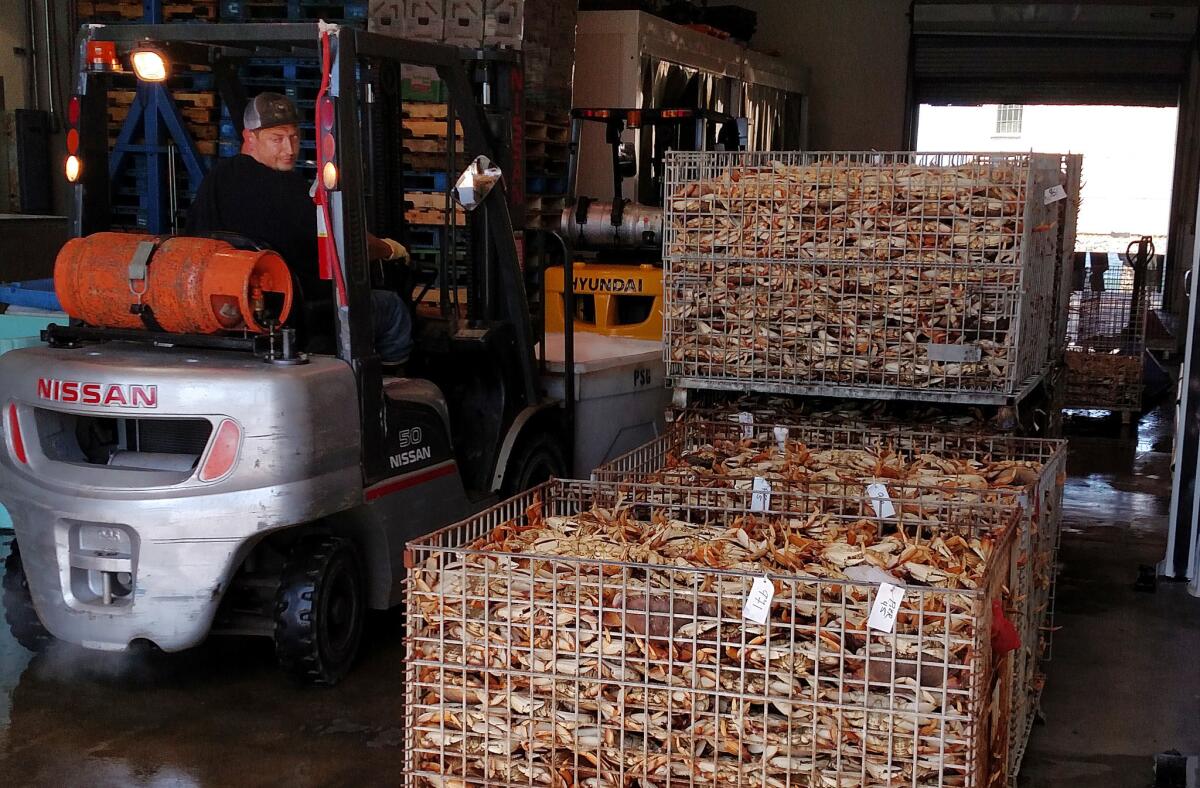San Francisco’s crabbers are back in business after toxic algae subside

The first batch of crab shortly after it arrived in San Francisco, four months after the traditional opening of Dungeness crab season was delayed by an onslaught of toxic algae that had the potential to poison consumers.
- Share via
Reporting from San Francisco — One by one, the big boats came in — the New Rayann, the Linda Noelle, Blind Faith. They circled past a breakwater and made their way to Pier 45.
With a well-practiced choreography of hoists and chains, bins and forklifts, each vessel quickly deposited thousands of pounds of flailing Dungeness crabs. The next morning, they would head back out for more.
This was on Thursday afternoon, a breezy, cloudless spring day in San Francisco. Two days earlier, after a delay of more than four months, the crabs offshore had been determined by state officials to be free of a toxic acid that had raised food safety concerns.
Still, as the boats returned with their first hauls of the season, it would be inaccurate to describe the scene on Pier 45 as festive. The skippers were reporting catches that were only a third to half of a typical opening day harvest in November.
“Too little, too late,” said Larry Collins, a veteran San Francisco fisherman who runs the Crab Boat Owners Assn. Collins said that, while the more veteran boat owners had savings set aside for slow seasons, he knew of others who had run up credit card debts in the tens of thousands of dollars during the winter idle. Industry-wide, the delay is estimated to have cost nearly $50 million.
The postponement was the result of a rare toxic algae that bloomed last year in Pacific waters warmed by El Niño conditions. The algae produce domoic acid, which does not harm crabs but can sicken people who consume them.
Throughout the delay, Collins and his colleagues stressed that it would be better to wait than to sell a single contaminated crab. And wait they did, through months of measurements by state officials of acid levels in crabs caught for testing purposes.
Collins describes crab as something of a “religion” in and around San Francisco, a ritualistic component of winter celebrations — Christmas, New Year’s, the Lunar New Year, and January community “crab feeds” that raise money for private schools, churches, youth sports teams, firehouses, you name it.
Whether consumers will develop a similar passion for spring crabs is a question that looms heavy for all those who operate in the crab industry, from crabbers, to wholesalers, to restaurateurs.
That said, there was some satisfaction in seeing activity return to Pier 45. In December, in what should have been a frenetic season for the crabbers, there had been a ghostly look and feel to the pier, one of the last working remnants to what once was a thriving San Francisco waterfront.
Now there was the beeping of forklifts as they backed in bins of crabs, to be weighed and washed and submerged in vats of 208-degree water. Now the breezes that created white caps on the bay carried with them the vapor from the vats and the scent of the cooking crabs.
Mike Mitchell, the 68-year-old owner of the 44-foot Linda Noelle, stood on the pier and watched his crew unloading fresh crab — about half of what typically is caught on opening day. It was, the San Francisco native said, a better-than-nothing moment.
“If you are hungry and someone puts down a hot dog in front of you,” he said, “you don’t complain. You eat it.”
The last four months, Mitchell said, had been “tough.” He had been fishing for crab out of San Francisco for 46 years, and the protracted postponement was a first.
“Before this, I would have said I’ve seen everything there is to be seen – a little error there, I guess.”
See more of our top stories on Facebook >>
A block away, tourists who had been in short supply last December, were moving in throngs, and speaking many languages, as they lined up for crab bowls and crab sandwiches and crab T-shirts. Some ducked into the Alioto-Lazio Fish Co. for free samples or simply to watch live crabs dart about a small tank.
Co-owner Angela Cincotta surveyed the scene and declared it “kind of nice. The energy is back.”
The fish company proprietor was expecting delivery of two boatloads of crab later that night. And while the big winter holidays had been missed, it was suggested to her, at least there would be live crab in time for the opening day of baseball season, right?
“Exactly,” she said.
Crab and opening day, a new San Francisco tradition?
“Exactly,” she said.
Twitter: @peterhking
ALSO
Open-air urinal in San Francisco park has no designs on privacy
Study reveals hidden value of Baja California mangroves in climate change fight
A Jewish group is demanding the removal of a welcome sign at Crescenta Valley Park
More to Read
Sign up for Essential California
The most important California stories and recommendations in your inbox every morning.
You may occasionally receive promotional content from the Los Angeles Times.











